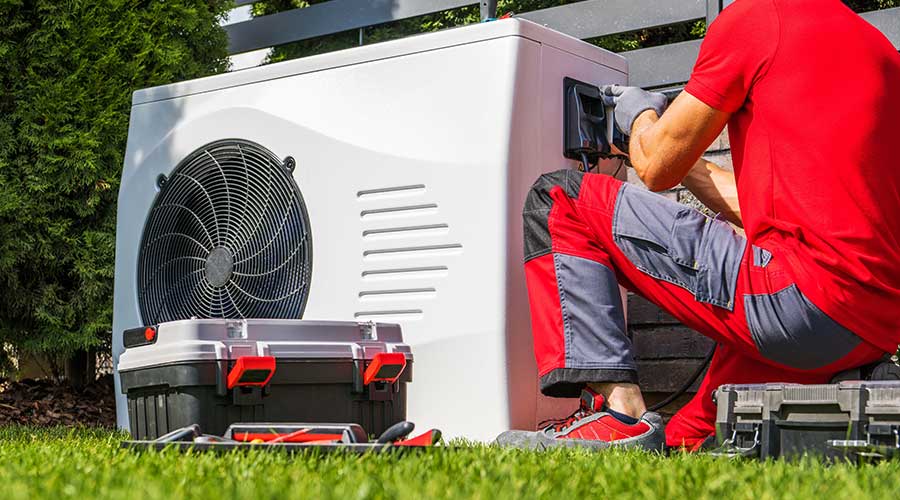With the push for more energy efficient technologies becoming stronger, many hospitals are looking to implement new innovations. A major contender for this is HVAC, as traditional HVAC systems (i.e., ones that use natural gas, propane or oil) tend to use quite a bit of energy. When providing heating and cooling to a potentially large facility like a hospital, there is going to be a lot of energy consumption.
A possible alternative to a traditional HVAC system is a heat pump. What is a heat pump, though?
According to the National Grid Group, a heat pump is “a device that takes heat from the air or ground around a building and increases it to a temperature that keeps our homes and businesses warm inside.” However, heat pumps are not limited to heating, they can also cool facilities and provide hot water.
Heat pumps are also energy efficient and and sustainable. This is mainly due to the fact that heat pumps do not rely on fossil-fuels to generate heating or cooling. Instead, heat pumps move heat around as opposed to generating heat.
According to MIT Technology Review, this is because a refrigerant moves throughout a circuit while also absorbing and releasing heat as it moves. Electricity powers this process as the refrigerant is pushed through a cycle. While moving in the heat pump, the refrigerant is compressed and expanded. As it does this, it switches between gas and liquid states to enable it to draw and release heat at different points in said cycle.
Since heat pumps are considered more energy efficient, their use can translate to more energy savings down the line. However, the upfront costs of heat pumps deters many facilities, including hospitals, from switching from traditional HVAC systems to heat pumps. This can be somewhat mitigated through the recently passed Inflation Reduction Act, which expanded the 179D tax deduction for commercial facilities. In short, it eases some of the upfront costs of purchasing and installing a heat pump through tax incentives for using energy efficient technology.
There are some things to consider when upgrading or switching to a heat pump system. Firstly, there are different types of heat pumps. According to the U.S. Department of Energy, these are the main types of heat pumps:
- Air-source heat pumps, which work by transferring heat between the inside of a building and the outside air. They are also the most common type.
- Geothermal heat pumps, which work by transferring heat between the inside of a building and the ground or an adjacent water source. They can be more expensive upfront, however, they typically have lower operating costs.
- Ductless air-source heat pumps, which work for buildings without ducts.
- Absorption heat pumps, which use heat or thermal energy for power. They can be driven by heat sources like natural gas combustion, steam solar-heated water and air/geothermal-heated water.
The type of heat pump for a given hospital will vary depending upon the individual hospital’s needs.
Another thing to consider is indoor air quality (IAQ) in the hospital environment. IAQ is a major concern for hospitals, as they are exposed to all sorts of bacteria and viruses. In order to keep those filtered out, HVAC systems also provide forms of ventilation. In a similar vein, heat pumps actively move air in and out of a building, or a hospital in this case. This keeps the air from growing stagnant.
Overall, heat pumps can provide an energy-efficient alternative to the more traditional HVAC systems. While adoption of this technology was slow initially, it is starting to noticeably increase as more facilities and their respective businesses push towards greener options. Hospitals will not be too far behind this curve either.
Jeff Wardon, Jr. is the assistant editor for the facilities market.

 UF Health Hospitals Rely on Green Globes to Realize Their Full Potential
UF Health Hospitals Rely on Green Globes to Realize Their Full Potential How Healthcare Facilities Can Be Truly Disaster-Resilient
How Healthcare Facilities Can Be Truly Disaster-Resilient TriasMD Breaks Ground on DISC Surgery Center for San Fernando Valley
TriasMD Breaks Ground on DISC Surgery Center for San Fernando Valley Bigfork Valley Hospital Falls Victim to Data Breach
Bigfork Valley Hospital Falls Victim to Data Breach AI-Driven Facilities: Strategic Planning and Cost Management
AI-Driven Facilities: Strategic Planning and Cost Management